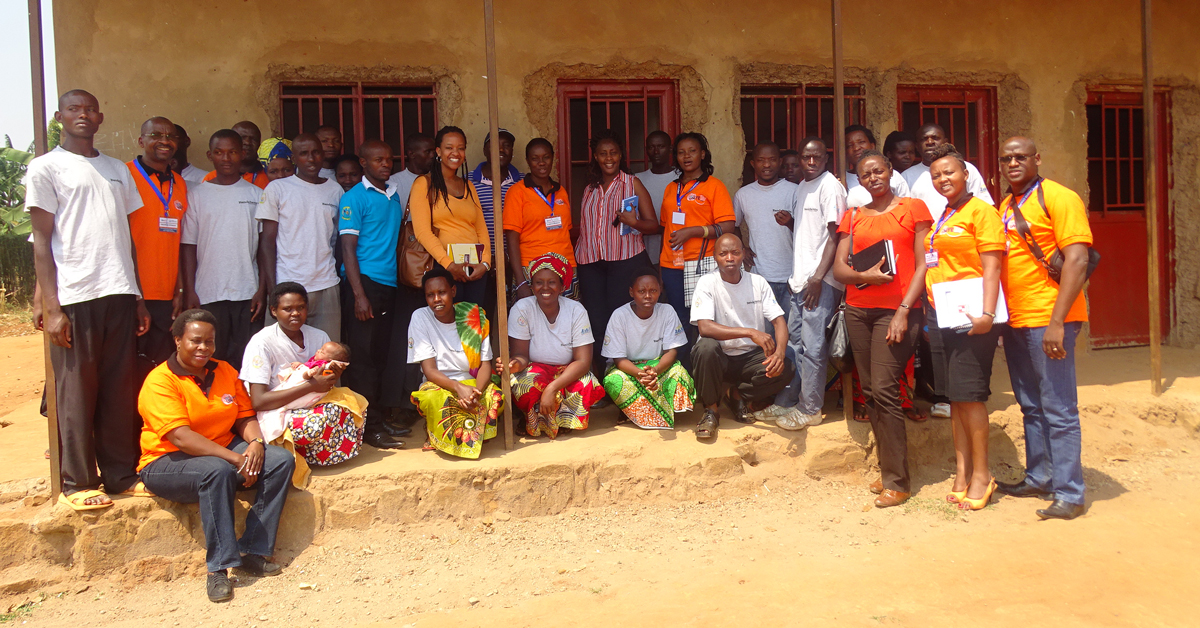Guest post from Catherine Githae (MenKen) and Jean Claude Butera (RWAMREC)

In recent decades, Rwanda has accelerated its progress toward gender equality across a variety of sectors, especially in politics. Today, 64% of the country’s parliament is female, which is greater than any other country in the world. Rwanda has also made significant progress toward combatting sexual and gender-based violence (SGBV); its One Stop Centers, for example, provide comprehensive services to individuals experiencing SGBV. As a result of this progress, the Africa UNiTE Kenya Chapter (AUKe) selected Rwanda as a priority country for an exchange visit focused on SGBV and gender equality programming.
Africa UNiTE is the regional component of the United Nations (UN) Secretary-General’s global UNiTE to End Violence Against Women campaign. Launched in January 2010, the continent-wide partnership works to end violence against women and girls. The Africa UNiTE Kenya Chapter (AUKe) Steering Committee was established as Kenya’s arm of the Africa UNiTE campaign, and it provides a collective platform for a wide range of stakeholders – government representatives, civil society organizations, the private sector, the media, and the UN – to harmonize and synergize efforts toward raising public awareness, stimulating behavior change, and increasing political will and resources for preventing and responding to all forms of violence against women and girls in the country.
Through the MenEngage Kenya Network (MenKen) and Lvct Health, AUKe and UN Women Kenya Country Office sponsored a delegation of 10 civil society members, UN Women staff, and government representatives to travel to Rwanda for an exchange visit hosted by MenCare partner Rwanda Men’s Resource Center (RWAMREC). The objective of the visit was to learn good practices in SGBV prevention and response strategies, in male engagement, and in women’s empowerment by engaging with institutions, projects, and partners involved in Rwanda’s gender equality programming.
The visit presented a unique opportunity for the AUKe delegation to learn from RWAMREC’s suite of projects promoting gender equality and nonviolence among men and boys. The delegation was briefed on RWAMREC’s several intervention models, including:
- Journey of Transformation, which engages men as partners in women’s economic empowerment and SGBV prevention;
- MenCare+, which engages young men, young women, and fathers as positive and supportive partners in sexual and reproductive health and rights (SRHR) and in maternal, newborn, and child’s health (MNCH);
- Boys4Change, which promotes peer-to-peer mentorship among young people;
- “Umugoroba w’Ababyeyi”, which engages opinion leaders to prevent SGBV and promote healthy families.
The AUKe delegation undertook a field visit to Rwamagana District, where they had the opportunity to attend a MenCare+ fathers’ group. The participants were dressed in orange in honor of Orange Day, a day to raise awareness and take action against violence against women and girls.
The delegation learned more about MenCare+ during their visit, including its work to engage men as partners in MNCH and SRHR and as advocates of SGBV prevention. They learned that, in addition to Rwanda, the three-year, four-country MenCare+ initiative is being implemented in Brazil, Indonesia, and South Africa.
RWAMREC explained that, in Rwanda, implementation of MenCare+ fathers’ groups is currently being undertaken in four sectors in the Rwamagana district. In each sector, three men are initially recruited to promote the program. Each of these three reaches 12 additional men, and each of these 12 reaches 36 more, thereby expanding the project’s breadth. Targeted participants are 21-35 years old and include fathers-to-be, and men with one or two children. MenCare+ also provides groups for young men and for young women who are 18-24 years old.
The group education cycle has 15 sessions of approximately 15 participants, and local leaders are involved in mobilizing and supporting the initiative. Each session is taught once a week at a time and location decided upon by the members, and some sessions are guided by trained health professionals or legal professionals, depending on the topic.
The AUKe delegation was impressed by the testimonies of success achieved by the project, some of which were shared during this visit. The impact of MenCare+ was evidenced by the fact that fathers came with their newborns to the session and were eager to tell their stories.
MenKen’s National Chair Fredrick Nyagah, who led the delegation, noted that AUKe participants completed their visit with several key lessons learned:
- Involvement of opinion leaders and local administration is key to the selection of trusted community volunteers;
- Partnerships with key stakeholders and professionals strengthen the implementation of the project;
- Evidence-based programming is strategic to achieving better programmatic results;
- Involved fatherhood has a lasting impact on improving sexual and reproductive health, as well as on promoting gender equality. Scaling up a project like MenCare+ can propel these gains.